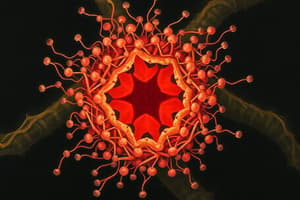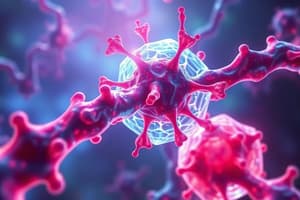Podcast
Questions and Answers
What is the main role of MHC cell surface proteins in the immune system?
What is the main role of MHC cell surface proteins in the immune system?
- Inhibiting cytokine production
- Presenting peptide antigens to T cell receptors (correct)
- Producing antibodies against pathogens
- Activating B cells directly
Which type of T cells primarily recognize peptides presented by Class I MHC molecules?
Which type of T cells primarily recognize peptides presented by Class I MHC molecules?
- Regulatory T cells
- Natural killer cells
- CD8+ cytotoxic T cells (correct)
- CD4+ helper T cells
What role do T cell receptors (TCRs) play in recognizing antigens?
What role do T cell receptors (TCRs) play in recognizing antigens?
- Producing cytokines upon interaction
- Inhibiting antigen presentation by MHC molecules
- Binding specifically to peptide-MHC complexes (correct)
- Activating macrophages directly
Where do Class II MHC molecules present peptides derived from?
Where do Class II MHC molecules present peptides derived from?
What is the specificity of the interaction between TCRs and the peptide-MHC complex?
What is the specificity of the interaction between TCRs and the peptide-MHC complex?
What is the role of immunodominant peptides in the context of T cell activation?
What is the role of immunodominant peptides in the context of T cell activation?
Which of the following factors influences the selection of immunodominant peptides during antigen processing?
Which of the following factors influences the selection of immunodominant peptides during antigen processing?
What is the primary function of Class I MHC molecules in the antigen processing pathway?
What is the primary function of Class I MHC molecules in the antigen processing pathway?
What is the significance of T cell receptors in recognizing antigens?
What is the significance of T cell receptors in recognizing antigens?
Which statement accurately describes the antigen processing pathway for Class II MHC molecules?
Which statement accurately describes the antigen processing pathway for Class II MHC molecules?
What is the main origin of peptide antigens presented by Class I MHC molecules?
What is the main origin of peptide antigens presented by Class I MHC molecules?
What is responsible for transporting peptide fragments from the cytosol into the endoplasmic reticulum (ER) in antigen processing for Class I MHC molecules?
What is responsible for transporting peptide fragments from the cytosol into the endoplasmic reticulum (ER) in antigen processing for Class I MHC molecules?
What is the key component that makes up Class I MHC molecules along with the heavy chain and β2 microglobulin?
What is the key component that makes up Class I MHC molecules along with the heavy chain and β2 microglobulin?
Which type of proteins are NOT a source of peptide antigens for Class I MHC molecules?
Which type of proteins are NOT a source of peptide antigens for Class I MHC molecules?
During antigen processing for Class I MHC molecules, what degrades intracellular proteins within the cytosol?
During antigen processing for Class I MHC molecules, what degrades intracellular proteins within the cytosol?
Which process ensures that only peptides capable of stable binding to Class I MHC molecules are presented on the cell surface?
Which process ensures that only peptides capable of stable binding to Class I MHC molecules are presented on the cell surface?
Where are peptide antigens loaded onto Class I MHC molecules during biosynthesis?
Where are peptide antigens loaded onto Class I MHC molecules during biosynthesis?
What is the main function of CD8+ cytotoxic T lymphocytes (CTLs) in response to peptide-MHC complexes on the cell surface?
What is the main function of CD8+ cytotoxic T lymphocytes (CTLs) in response to peptide-MHC complexes on the cell surface?
Which molecule specifically recognizes and binds to the peptide-MHC complex on the cell surface?
Which molecule specifically recognizes and binds to the peptide-MHC complex on the cell surface?
During which stage does the activation of CD8+ CTLs by the peptide-MHC complex occur?
During which stage does the activation of CD8+ CTLs by the peptide-MHC complex occur?
Where do peptide antigens originate for Class II MHC molecules?
Where do peptide antigens originate for Class II MHC molecules?
What is the role of Class I MHC molecules in the immune system?
What is the role of Class I MHC molecules in the immune system?
Which cells are responsible for recognizing peptide-MHC complexes on the cell surface?
Which cells are responsible for recognizing peptide-MHC complexes on the cell surface?
What is the function of the Ii protein in the antigen processing pathway?
What is the function of the Ii protein in the antigen processing pathway?
Which statement accurately describes the origin of peptide antigens for Class I MHC molecules?
Which statement accurately describes the origin of peptide antigens for Class I MHC molecules?
Which type of cells express Class II MHC molecules?
Which type of cells express Class II MHC molecules?
What is the primary role of CD4+ helper T cells?
What is the primary role of CD4+ helper T cells?
Which cells recognize antigens presented by MHC molecules?
Which cells recognize antigens presented by MHC molecules?
What is the main function of CD8+ cytotoxic T lymphocytes?
What is the main function of CD8+ cytotoxic T lymphocytes?
Where do Class I MHC molecules primarily present peptides from?
Where do Class I MHC molecules primarily present peptides from?
Which types of T cells recognize peptides presented by MHC Class I molecules?
Which types of T cells recognize peptides presented by MHC Class I molecules?
Which cells express Class I MHC molecules?
Which cells express Class I MHC molecules?
What is the main function of CD4+ T cells in immune responses?
What is the main function of CD4+ T cells in immune responses?
Which of the following is a characteristic of Class II MHC molecules?
Which of the following is a characteristic of Class II MHC molecules?
What is the specific function of CD8+ cytotoxic T lymphocytes upon recognizing peptide-MHC class I complexes?
What is the specific function of CD8+ cytotoxic T lymphocytes upon recognizing peptide-MHC class I complexes?
What ensures the specificity and fidelity of T cell responses to antigenic peptides presented by MHC molecules?
What ensures the specificity and fidelity of T cell responses to antigenic peptides presented by MHC molecules?
Where are protein antigens processed and degraded to generate peptide fragments for presentation to T cells?
Where are protein antigens processed and degraded to generate peptide fragments for presentation to T cells?
What is the role of MHC cell surface proteins in the immune system?
What is the role of MHC cell surface proteins in the immune system?
What is the significance of TCR recognition of both the peptide antigen and the MHC molecule?
What is the significance of TCR recognition of both the peptide antigen and the MHC molecule?
In T cell recognition, what do the variable regions of the TCR specifically bind to?
In T cell recognition, what do the variable regions of the TCR specifically bind to?




